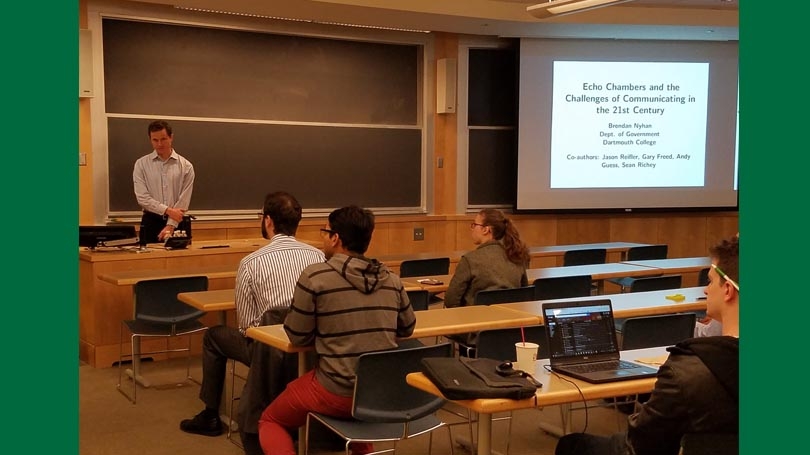
Dartmouth Professor of Government, Brendan Nyhan, talks to participants at the STEPS mini-conference held last month
The Science Technology and Engineering Policy Society (STEPS) held their 2nd annual mini-conference on October 14, 2017. The event advocated for the understanding of science issues impacting our society, namely childhood vaccinations. The conference strategically chose three distinct speakers who focused the issue of vaccinations from three different viewpoints: fundamental vaccine knowledge, effective communication of scientific knowledge, and science policy knowledge.
The conference kicked-off with Dartmouth Ph.D. candidate, Jennifer Lai (Thayer School of Engineering) with a brief introduction on how vaccines were first discovered and implemented, followed by a comprehensive overview of what vaccines are and the recent pioneering progress in the field. One of the most serious health and development challenges is human immunodeficiency syndrome (HIV), which affects many people worldwide. Currently, there is no effective cure or vaccine for HIV due to the rate of mutation and the mechanisms of defense that the virus possesses. Through her work in Biological Engineering with Professor Margaret Ackerman, Lai is tackling this issue by understanding the intricacies of how antibodies are created and their functions that lead to the interaction with the virus.
The Lancet scientific article published in 1998 which correlated mumps, measles and rubella vaccinations to autism that started an anti-vaccine movement. Even though The Lancet article was retracted, and the Center for Disease Control and Prevention (CDC) have facts on MMR vaccine showing no autism correlation, people’s behavior does not significantly change and some even develop a more negative response. To give some possible explanations as to why the message from the CDC was ineffective, Professor Brendan Nyhan spoke about the echo chambers and the challenges of communicating in the 21st century.
There are two key communication challenges which include selective exposure (tendency to accept information that coincides with pre-existing views) and selective acceptance (ignoring the information). Currently, there is no single best method to deliver information because, based on the audience’s background and culture, there are many different channels for communicating effectively. Therefore, the best practices include acting before myths become widespread, avoiding controversy where possible, and understanding the power of social norms.
Dr. Ariel Marshall concluded the conference by sharing her valuable personal experiences as a senior policy advisor to the Democratic Senator for New Hampshire, Jeanne Shaheen. Dr. Marshall has an extensive portfolio that covers sectors such as energy, environment, and science policy. She described some of the changes that have been occurring since the start of her career as a policy advisor including the significant reduction in federal funding for science what has dropped from 70% to 50%. Science funding may continue to drop with plans for major cuts to the National Institutes of Health, Department of Energy, National Science Foundation, and Environmental Protection Agency. Dr. Marshall stressed the importance of a continual dialogue between the constituents and representatives to communicate our needs for science funding to progress scientific knowledge.
If you're interested in learning more about effective science communication and how to reach your State Representative, STEPS President and PhD candidate Nicholas Warren has created a handy guide, which you can access here.